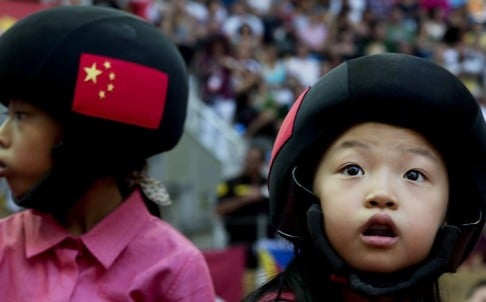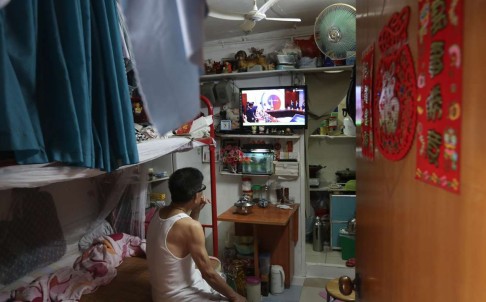Editorial : Xi hexin and new democracy [Editorial] Editorial : Xi hexin and new democracy
習核心推新權威新民主 反腐辣招還靠輿論監督
Publishing Date: 2016/11/1
【明報專訊】AT the 6th plenum of the 18th Central Committee of the Communist Party of China (CPC), which closed last week, Xi Jinping was established as the hexin (core) of the whole Party, and Certain Criteria Regarding Intra-Party Political Life in the New Situation and Rules of Intra-Party Supervision of the Communist Party of China (two sets of regulations applicable to Party members) were adopted. Xi Jinping will go to any length to beef up the authority he has as a leader. In the making of the two sets of regulations, he increased intra-Party democracy. This is the new "basic point" of what the "Xi hexin regime" will do in running the Party and the country.
中共十八屆六中全會上周結束,確立習近平為中共全黨的核心,並通過了《關於新形勢下黨內政治生活的若干準則》和《中國共產黨黨內監督條例》兩個黨內法規。習近平確立為中共新的核心,將極大強化他個人的領導權威。而他在兩個法規的制訂中,亦強化黨內民主。高層大權集中,基層保障民主,這將成為「習核心」新體制治黨治國的新基點。
The CPC Central Committee stressed at its 6th plenum, "Intra-Party democracy is the Party's life. No body or member of the Party should suppress or disrupt intra-Party democracy. Any member of the Party is entitled to disclose or report responsibly to the Party any illegality or irregularity on the part of any body or any other member of the Party. Those who do so are encouraged to give real names." It can thus be seen that the Xi hexin's "new authority" includes "new democracy". In other words, he puts greater emphasis than any of his predecessors on protecting the democratic rights Party bodies at all levels enjoy and especially those rank-and-file Party members enjoy. At the same time, he wants to ensure by means of this sort of democratic intra-Party supervision that "decrees will go out of Zhongnanhai" — that the Xi hexin regime's general and specific policies will be carried out.
六中全會強調:「黨內民主是黨的生命。任何黨組織和個人都不得壓制黨內民主、破壞黨內民主。黨員有權向黨負責地揭發、檢舉黨的任何組織和任何黨員違紀違法的事實,提倡實名舉報。」可以見到,習核心「新權威」,也包含「新民主」,即較前任更強調保障各級黨組織尤其是基層黨員的民主權利。同時,透過這種黨內民主的監督作用保障「政令可出中南海」,習核心體制的大政方針得以貫徹落實。
The Rules have yet to be made public in full. However, they presumably include at least what has to do with political lines and policies and with the war against corruption. Since shibada (the 18th National Congress of the CPC) ended, many high-ranking officials have been toppled. The situation is disastrous. This shows "princes" and "high officers on the frontier" have been severely afflicted. It once was a problem "who should supervise one who heads a province or a municipality". Therefore, the central authorities have set up a group of inspectors who are like "imperial commissioners" as times require. If intra-Party supervision amounts to much in the wake of the 6th plenum, it will presumably be an efficacious cure for the malady of "always managing to find ways to counter superior authorities' measures" (which is prevalent among province and municipality heads) and the vice of "taking the lead in being corrupt" and that of "collective corruption".
《黨內監督條例》目前還未見公布全文,但是相信至少包括兩個內容,一是政治上的路線政策;二是反貪腐。十八大以來落馬高官成災的狀况顯示,各地諸侯、封疆大臣是重災區,「誰來監督省市第一把手」一度成為大問題,中央欽差式的的巡視組因此應運而生。六中之後,黨內民主監督若然能夠形成氣候,相信對於「省市一把手」上有政策下有對策的常見病,以至帶頭腐敗、集團腐敗之惡習,能夠形成有力的遏制作用。
However, that is inadequate. Since shibada ended, many an official who heads a province or a municipality has committed crimes in spite of and contrary to admonitions. Such an official may restrain himself when the central authorities' inspectors are on his turf, but he will be as corrupt as he has been once they leave. Such a high-ranking official is often caught when those inspectors give him a "back thrust". One may say never over the past four years has the Central Commission for Discipline Inspection (CCDI) or the central authorities' group of inspectors been soft or merciful to any corrupt officials. However, because there is now a high degree of "power-market integration" on the mainland, demons called greed often manage to induce frail souls to break flimsy rules. Things are not yet actually such that no officials dare to be corrupt, and efforts have yet to be directed at making it "impossible" or "undesirable" to be corrupt. Therefore intra-Party supervision is inadequate. It is necessary to use two anti-corruption means that have proved effective in other places — public supervision and the policy of leaving everything in the sun. The authorities should allow the public to supervise them so that officials can hardly "shield one another". We believe that, with the people's help, high-ranking officials can exorcise demons called greed from their souls. If they manage to do so, the CCDI will have much less to do.
不過,這還是不夠的。十八大以來,不聽勸告頂風犯案的高官還是不時出現,不少省市在中央巡視組到來時暫時收斂,巡視組一走便照貪不誤,往往被巡視組殺「回馬槍」時逮住。4年來,中紀委和中央巡視組可謂「鐵腕反腐」,毫不手軟,毫不留情,但是在當下內地「權力和市場高度結合」的現况下,貪婪的魔鬼往往能夠引誘脆弱的靈魂去突破薄弱的制度,「不敢腐」尚未真正做到,「不能腐、不想腐」還只是努力方向。故此,黨內監督還是不夠,還要借鑑國際反腐的成功辣招:陽光政策和輿論監督。放開輿論監督,除去「官官相衛」的保護罩,相信有廣大人民群眾幫助,高官去除遏抑心靈中貪婪的魔鬼,中紀委便省事多了。
明報社評2016.10.31
■Glossary
beef up
make something bigger, better, more interesting, etc
turf
the place where somebody lives and/or works, especially when they think of it as their own
exorcise
remove something that is bad or painful from your mind
Audios provided by John W




